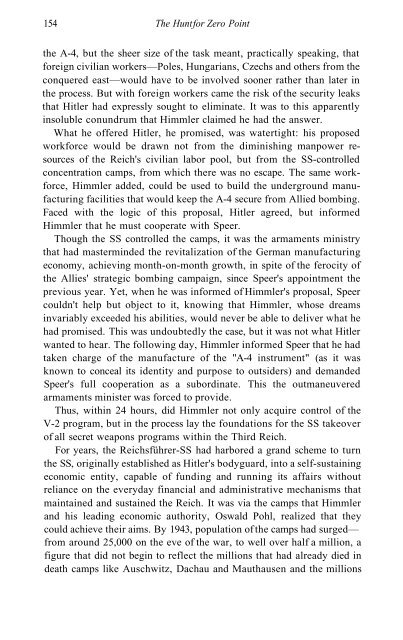ScienceDirect - Technol Rep Tohoku Univ ... - Garryck Osborne
ScienceDirect - Technol Rep Tohoku Univ ... - Garryck Osborne
ScienceDirect - Technol Rep Tohoku Univ ... - Garryck Osborne
You also want an ePaper? Increase the reach of your titles
YUMPU automatically turns print PDFs into web optimized ePapers that Google loves.
154 The Hunt for Zero Point<br />
the A-4, but the sheer size of the task meant, practically speaking, that<br />
foreign civilian workers—Poles, Hungarians, Czechs and others from the<br />
conquered east—would have to be involved sooner rather than later in<br />
the process. But with foreign workers came the risk of the security leaks<br />
that Hitler had expressly sought to eliminate. It was to this apparently<br />
insoluble conundrum that Himmler claimed he had the answer.<br />
What he offered Hitler, he promised, was watertight: his proposed<br />
workforce would be drawn not from the diminishing manpower resources<br />
of the Reich's civilian labor pool, but from the SS-controlled<br />
concentration camps, from which there was no escape. The same workforce,<br />
Himmler added, could be used to build the underground manufacturing<br />
facilities that would keep the A-4 secure from Allied bombing.<br />
Faced with the logic of this proposal, Hitler agreed, but informed<br />
Himmler that he must cooperate with Speer.<br />
Though the SS controlled the camps, it was the armaments ministry<br />
that had masterminded the revitalization of the German manufacturing<br />
economy, achieving month-on-month growth, in spite of the ferocity of<br />
the Allies' strategic bombing campaign, since Speer's appointment the<br />
previous year. Yet, when he was informed of Himmler's proposal, Speer<br />
couldn't help but object to it, knowing that Himmler, whose dreams<br />
invariably exceeded his abilities, would never be able to deliver what he<br />
had promised. This was undoubtedly the case, but it was not what Hitler<br />
wanted to hear. The following day, Himmler informed Speer that he had<br />
taken charge of the manufacture of the "A-4 instrument" (as it was<br />
known to conceal its identity and purpose to outsiders) and demanded<br />
Speer's full cooperation as a subordinate. This the outmaneuvered<br />
armaments minister was forced to provide.<br />
Thus, within 24 hours, did Himmler not only acquire control of the<br />
V-2 program, but in the process lay the foundations for the SS takeover<br />
of all secret weapons programs within the Third Reich.<br />
For years, the Reichsführer-SS had harbored a grand scheme to turn<br />
the SS, originally established as Hitler's bodyguard, into a self-sustaining<br />
economic entity, capable of funding and running its affairs without<br />
reliance on the everyday financial and administrative mechanisms that<br />
maintained and sustained the Reich. It was via the camps that Himmler<br />
and his leading economic authority, Oswald Pohl, realized that they<br />
could achieve their aims. By 1943, population of the camps had surged—<br />
from around 25,000 on the eve of the war, to well over half a million, a<br />
figure that did not begin to reflect the millions that had already died in<br />
death camps like Auschwitz, Dachau and Mauthausen and the millions


